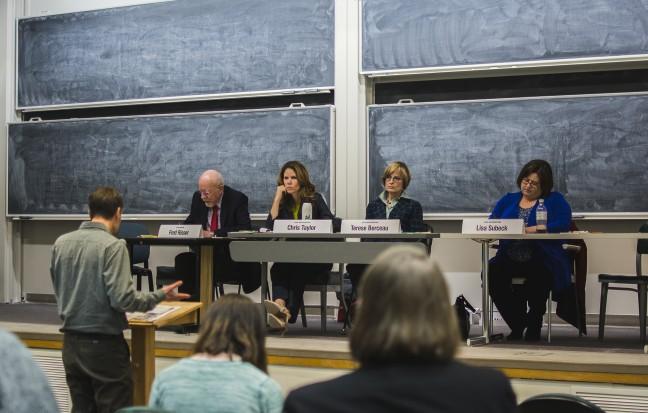At a University of Wisconsin budget listening session, Madison community members spoke to a panel of state representatives to share their thoughts and concerns about Gov. Scott Walker’s budget proposal.
Sen. Fred Risser, D-Madison; Rep. Chris Taylor, D-Madison; Rep. Terese Berceau, D-Madison; Rep. Lisa Subeck, D-Madison; and Rep. Gary Hebl, D-Sun Prairie, sat on a panel to listen to concerned community members and review the importance of the budget cut and the effects it may have on Madison.
Taylor said the discussion was important because UW is the fourth largest research institution in the nation and has a $12.4 billion economic impact on the state’s economy each year.
UW can not just dip into federal grant money to pay for classes, Michael Kissick, assistant professor of medicine and public health, said. If UW can not afford them, they will be cut, he said.
This deeply harms the education of both undergraduate and graduate students, Kissick said. Kissick said he suggests that there be some sort of tangible number to express the effects on the “health” of the university these budget cuts will have.
“It is very critical that the citizens of the state understand what is going on,” Kissick said. “Professors exist not on a national market but on an international market and can consider going somewhere else.”
These cuts could potentially harm a student’s ability to graduate within four years as advising services and classes are facing being cut, Terry Warfield, professor of business, said.
The best way to approach this issue is to get in touch with people in positions of power in the state in order to make them understand the damage budget cuts of this magnitude will have, Warfield said. It can be a difficult balancing act for faculty to maintain good relations and stand up against these cuts, he said.
“It is a tough balance for faculty to get out in front of these things when we are relying on these various parties to support other things going on at the university,” Warfield said.
Ramzi Fawaz, assistant professor of English, spoke on behalf of Letters and Sciences majors and the damage the department is facing. Humanities is looking at facing the brunt of these cuts as the majors within the L&S college are deemed less economically valuable than those of science, technology, engineering and mathematics majors, Fawaz said.
L&S provides a unique education that allows students to flourish while understanding culture, gender, race and many other facets found in L&S degrees, Fawaz said. Although STEM majors are assumed to be of more economic value, the writing skills that are provided through the humanities are a universal necessity no matter what major, he said.
“The cuts are really about ideology and not money,” Fawaz said.
These budget cuts are not just affecting faculty and students but also the blue collar workers employed at the university, Barb Peters, president of Local 171, said. 400 employees at UW do not make a living wage, she said.
Peters said every week she deals with phone calls from her workers saying they are going to lose their houses and inquiring what they should do about their unsustainable wages. The custodial workers have not seen a raise in more than six years, she said.
The education and jobs of more than 10,000 staff members on the UW campus are more important than the Milwaukee Bucks, Peters said.














